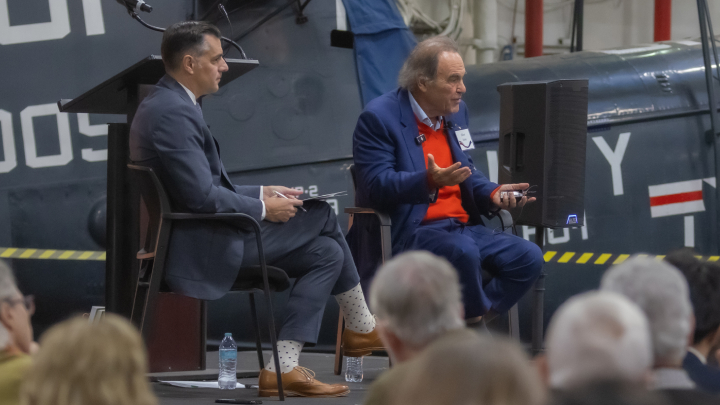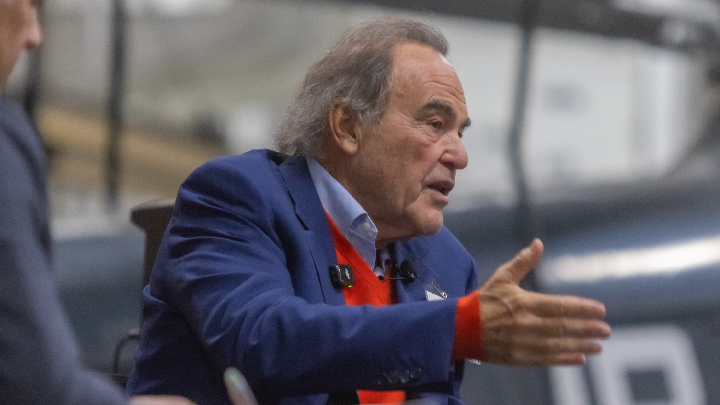Director Oliver Stone leads lecture on impacts of Vietnam War 50 years later
Stone, an award-winning director and Vietnam War veteran, spoke about his experience on the frontlines and the diplomatic lessons the U.S. has learned since

During the Vietnam War, USS Midway’s below-deck hangar quartered iconic fighter jets like F-4 Phantoms and F-8 Crusaders. These days, the space is a showroom for the USS Midway Museum’s restored planes, helicopters, and flight simulators that help tell the story of the United States military’s proud tradition of aviation innovation.
There is also space carved out of the vast hangar for special events. Last Thursday, San Diego State University’s Center for War and Society and the Quincy Institute for Responsible Statecraft hosted renowned American film director Oliver Stone to share a different story about our country's military history.
“Vietnam at 50: Documenting the Legacies of America’s Forever Wars,” the title of Thursday’s talk by Stone, examined how the Vietnam War, and other wars before and after, shaped foreign policy and American society, and set the tone for so-called “forever wars” the U.S. has found itself involved in since the end of Vietnam.
 Open the image full screen.
Open the image full screen.Guided by questions from Gregory Daddis, director of the Center for War and Society and USS Midway Chair in Modern U.S. Military History, Stone began the talk with details of his early life, growing up a son to an Army Lieutenant Colonel who served on President Eisenhower’s staff in Paris, France and post-occupation Berlin, Germany during World War II, and how his father’s anti-communism stance influenced his own ideology.
“As the war ended and the U.S. became more conscious of the so-called Russian threat … He joined the band because I guess that’s one way to get ahead,” Stone said.
It wasn’t fear, so much, that pushed Stone to enlist in the Army during Vietnam. He talked about how he spent a year in South Vietnam as a teacher and left the country with more questions than answers.
“I didn’t feel like my education was complete. I was still confused about what was going on because I didn’t understand all of the politics … I went back because I didn’t feel that I knew enough. I didn’t want to be a fraud,” Stone recounted. “I felt like I had to go to this war to understand it. I had to go back. I had already seen a bit of it from the fringes, but I went right into the heart of it in ‘67.”
He also briefly discussed a period of several years following his return from war during which he struggled with, and eventually overcame, various mental health challenges, and how he settled on film school.
“You can get a college degree from watching movies? Why not?” Stone quipped.
Stone went on to direct a trilogy of Vietnam War-focused films that address the brutality and politics of the conflict, starting with “Platoon” in 1986. The film was based, in part, on Stone’s own experience on the frontlines, for which he was awarded a Bronze Star for valor. The film won four Academy Awards, including Best Picture and Best Director.
“Born on the Fourth of July” (1989) is based on the autobiography of Ron Kovic by the same title. Stone again won the Academy Award for Best Director.
The last film of the trio was “Heaven & Earth” (1993), based on the memoirs “When Heaven and Earth Changed Places” and “Child of War, Woman of Peace” by Vietnamese-American writer Le Ly Hayslip, who was in attendance Thursday on USS Midway.
“No film is going to change people if they don’t want to be changed. A lot of people saw that movie and signed up. A lot of them went to the Iraq War … You can’t say that [it’s anti-war]. You can just say, ‘Here it is,’” he said.
Throughout the lecture, Stone spoke about the nation’s military-industrial complex and how it evolved and influenced U.S. action in different conflicts spanning the 20th century, and the aftermath of those conflicts on foreign policy.
One of Daddis’ final questions for Stone was about legacies, and what the most important legacy of the Vietnam War was.
“Obviously nothing. Nobody paid attention and we keep going back to war. We’ve made one mistake after another in foreign affairs. We’re not a very smart country diplomatically. Had we been cooler, we could’ve gotten along with everybody in this world, with one or two exceptions. There’s no reason why we can’t be partners with Russia and with China, and we could have economic competition. We don’t need a war,” Stone said.
“We as a nation continue to wrestle with the legacies of our long and divisive war in Vietnam, even 50 years on,” Daddis said. “So to have one of America's foremost film directors share his thoughts on that war with our students and community is truly special. It's vital for us to consider how popular culture and film shape our conceptions of war and of the militarized foreign policies we undertake. And because Stone is both a veteran and a director, he brings a unique view to how Americans consume stories about wars and the soldiers who fought in them.”
Stone’s lecture was the fourth in the Center for War and Society’s ongoing J. Fred and Susan Oliver Speaker Series. The lectures are intended to foster informed dialogue around the impact of a militarized U.S. foreign policy on society. Student involvement is a key to the sponsorship. Last Thursday, nearly 25 SDSU students attended the lecture alongside scholars, guests, guests and military-affiliated organizations.
This year’s lecture event was co-sponsored by the Quincy Institute, the Washington, D.C. thinktank whose mission is to “promote ideas that move U.S. foreign policy away from endless war and toward vigorous diplomacy in the pursuit of international peace.”
For information about upcoming events, visit the Center for War and Society website.



